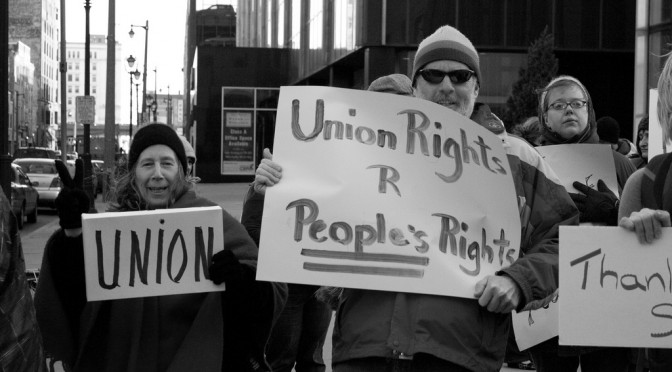By Penny Lewis
The Friedrichs case argued before the Supreme Court yesterday will decide the near-term fate of public sector unions in the United States. In this and the next blog post I am mulling over the roots and implications of this case; in the next I want to consider what it means for us here at CUNY and our current contract fight.
The basic issue facing the Court is whether the “agency fees” collected by public unions from public workers violate the first amendment rights of non-union workers. The plaintiffs are making the case that, because bargaining in the public sector involves issues like merit pay, public workers who do not support the positions their unions take on such issues are being forced to pay for political speech with which they disagree. (For more background on the case, please look here and here.)
The ideological — and more importantly, material — roots of this argument lie in the decades long assault launched by conservative groups, their corporate funders and their political allies to discredit and dismantle the collective power of workers.
In the political imaginary they advance, all power comes down to the power of the individual, the power of one — why should my right to, for instance, compete with my colleagues for a bigger slice of the pie, be impeded by a union to which I don’t even belong? Unions, of course, are predicated on the recognition that in a world where some individuals have significantly more power than others — due to wealth, race, citizenship rights, gender, sexuality, and so on — the only meaningful social power that oppressed and exploited individuals can exercise is that which arises from collective solidarity and joint action. Public sector unions leverage that collective power to better the livelihoods of public sector workers, whether they belong to the union or not — hence, “fair-share” fees.
In the decades since large scale unionization — and legal support for “fair share” agency fees — became norms in the U.S. public sector, public employment has been a critical route to economic and community stability for millions of working class families, and, most particularly, for African Americans and women. When Friedrichs is decided, as it most certainly will be, with the plaintiffs and against the unions, it will be the economic and political power of these workers and their communities that will be most threatened.
That the Friedrichs case is an attack on workers and unions is apparent on its face. But at this moment, this neoliberal attack on labor is likely to bear fruit not only because of the narrow framing of the case before the court, but because of the broader context within which this narrow question is considered. Justice Scalia remarked yesterday, “The problem is that everything that is collectively bargained with the government is within the political sphere, almost by definition.” Scalia’s reading, echoing questions raised by Justice Alito in previous cases and by the right-wing groups sponsoring the Friedrichs plaintiffs, suggests that Abood, the 1977 case that permitted agency fees, was unconstitutional from the get-go.
But it was not seen as such then. And I think one large part of the reasons why this Court at this time is so ready to hear this challenge is due to the other long-term assault launched by the same neoliberal networks: the battle over what government is about, who it is for, and the very existence of public goods and services.
For decades, free marketeers have set their sights on undoing a consensus that was centuries in the making over the appropriate roles and responsibilities of governments for the well-being of their peoples. The post-war period marked the point in which the “side” that had the upper hand was the one that advocated for more (and, in some places like the US, a bit less) robust political intervention in the economic sphere for the betterment of the many. Communist, social democratic, and welfare states differently expressed this fundamental notion across the globe. In such a landscape, bargaining over public sector workers’ well-being was not as easily recognized as “political.” It was common sense, self-evident, to assume that workers were entitled to a high standard of pay, decent working conditions, a secure retirement. The government was, to use Scalia’s phrase, “almost by definition” obliged to help facilitate such ends — whether it should do so was not, so to speak, on the table. Bargaining in this context allowed for a pretty clear distinction between the “non-political” bread and butter concerns of wages, working conditions, and benefits, and the unions’ “political” work of candidate and issue support.
But, no more. It has been the success of the right’s ability to (re-)politicize the basic functions, purposes and goals of the public sphere that creates the space for a majority victory for the Friedrichs plaintiffs to appear inevitable. (The “right” of course did not accomplish this alone: the Democratic Party has contributed decisively to this austerity realignment, as I will discuss more in the second part of this post.)
Should teachers have smaller classes? Job security? Do city workers deserve pensions? Should tax payers pay for firefighters health care costs? Should public sector workers get raises, at all? Is the government responsible for the well being of the people, including the very people who make it and its agencies run? That these are highly political questions today (and I should say, once again) informs the appearance of the open-and-shut nature of the Friedrichs case. While not talked about as such in the courtroom, these join the question of union power as central issues at debate in the Friedrichs case.
Penny Lewis is Academic Director of Labor Studies and an Associate Professor of Labor Studies at The Murphy Institute.



